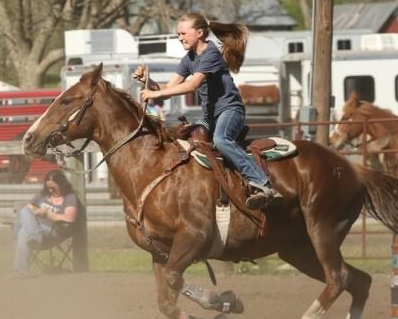Recently confirmed cases of Equine Herpes Myeloencephalopathy in North Dakota and South Dakota have prompted Nebraska State Veterinarian Dr. Dennis Hughes to remind horse owners to remember to always use best biosecurity practices.
“With fair, exposition and rodeo season gearing up, it is of utmost importance that horse owners and facility managers take appropriate precautions to prevent the introduction and spread of this disease in Nebraska,” said Hughes. “Vigilance is especially important in situations where horses can come into contact with each other. There can be a high susceptibility to the disease where we have horses co-mingling from different regions or states.”
EHM is the neurological form of Equine Herpes Virus (EHV-1). The confirmed cases of the disease in North Dakota and South Dakota are from horses that have been co-mingled with other horses during rodeo events. The South Dakota horse is believed to have attended rodeo events in both Lincoln and Hastings and is expected to make a full recovery.
The disease is spread through direct or indirect contact with infected horses, so Hughes encourages operators of horse shows and exhibitions to review their biosecurity plans and minimize the opportunity for horses to have direct or indirect contact with each other. Indirect contact includes the use of shared water and feed sources, as well as the use of shared equipment. In addition, Hughes said he recommends horse owners planning to travel to shows and exhibitions contact the venue prior to transporting their horses to inquire about entrance requirements for the event.
Biosecurity measures horse owners should take at their own operations include requiring individuals to wash their hands before and after contact with each horse, disinfecting boots and changing clothes that come into contact with horses other than their own.
“If possible, horse owners should avoid contact with other people’s horses, and isolate horses returning from shows or exhibitions for 3 to 4 weeks,” said Dr. Hughes. “Owners who will be co-mingling their horses also should consider contacting their veterinarian to discuss their horses’ current vaccination status and weigh the benefits of vaccination.”
Out of state horses entering Nebraska for any reason, must be accompanied by a certificate of veterinary inspection.
EHM symptoms include: fever, decreased coordination, nasal discharge, urine dribbling, loss of tail tone, hind limb weakness, leaning against a wall or fence to maintain balance, lethargy and the inability to rise. While there is no cure, the symptoms of the disease may be treatable. Additional information can be viewed at www.nda.nebraska.gov/animal/diseases/ehv/index.html.
